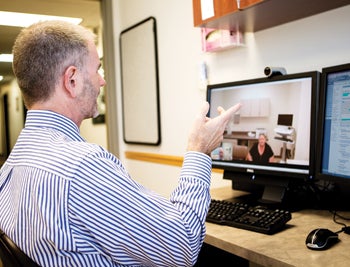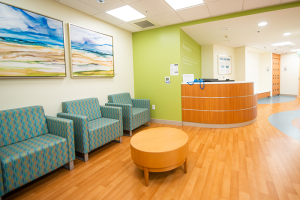Mercy to expand thriving telehealth program with new virtual care center
 |
| Tim Smith, M.D., a headache specialist in St. Louis, consults with a patient in a rural area. Photo by Chris Ryan |
Mercy, Chesterfield, Mo., will take its thriving telemedicine program to an even higher level when it opens what it calls the nation's first virtual care center in 2015.
The four-story, 120,000-square-foot center will accommodate nearly 300 physicians, nurses, specialists, researchers and support staff. The $50 million facility will deliver around-the-clock care through audio, video and data connections to Mercy's remote patients in four states.
Patients of health care providers outside its system and employers who partner with Mercy also can receive care through the telemedicine program. Mercy estimates that the virtual care center will manage more than 3 million telehealth visits in the five years after it opens, which will help to overcome a decline in primary care physicians.
"There's a decreasing number of physicians in both rural and urban areas while, at the same time, there's a growing senior population that will require more care," says Tom Hale, M.D., executive medical director of telehealth services.
It's all about making health care as convenient as possible for patients, says Wendy Deibert, R.N., vice president of telehealth services.
"If we can bring care close to home, it's ideal for the patients and it's fairly easy to provide using two-way audio and video," she says.
The new facility will allow Mercy to expand the patient monitoring aspect of its telemedicine program, which already comprises some 75 services, including:
• Mercy SafeWatch eICU: The largest, single-hub electronic intensive care unit (ICU) in the United States allows doctors and nurses to provide monitoring to more than 450 beds in 25 ICUs.
• Nurse on call: Registered nurses provide health advice and triage service around the clock.
• Home monitoring: The program provides continuous monitoring for more than 1,000 patients diagnosed with congestive heart failure, reducing hospitalization and readmissions while contributing to extended independent living.
"Our goal is to monitor as many patients as possible and use early warning systems to identify changes in status. The sooner we can identify issues, the faster we can deliver care," she says.
The new center also will serve as a hub for research on developing ways to optimize telemedicine, she adds.




